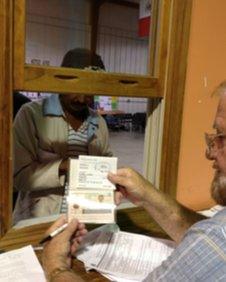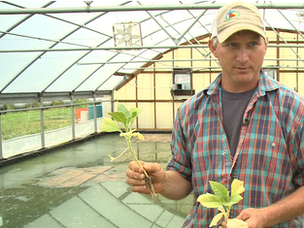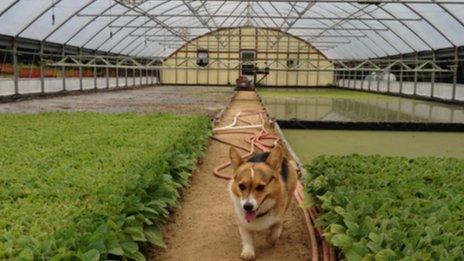US farmers look to Congress for immigration reform
- Published
Thousands of migrant workers are employed by US farmers
Huddled in the early morning North Carolina mist, hundreds of farm workers - newly arrived on buses from Monterrey, Mexico - quietly line up in a cavernous hall, clutching suitcases and passports.
"Seis seis tres. Seis seis tres." Six six three. Six six three.
Underneath US, Mexican and North Carolinan flags, numbers are called out and workers step forward from the pack and begin to fill out paperwork.
Brought here to the tiny town of Vass by the North Carolina Growers Association (NCGA), these farm workers are a rarity in the US agricultural constellation: Mexicans, here legally, who will return home at the end of the growing season.
Under the H-2A visa programme, which allows temporary farm workers, mostly from Mexico, mostly men, to come to the country to help with seasonal work, many of them have been coming to the US - and then leaving - for decades.
Jose Luis Rano Castro has worked on the same farm for 18 years.

A worker gives his passport for inspection
The pay - at $9.68 (£6.30) an hour - is triple what he can make in Mexico.
"I need the job to take care of my family," says Mr Castro, who doesn't get to see his three children - aged 13, eight and six - for the six months he works in the US.
"It's difficult to be away from them but it's worth the pain."
Growing pains
Last year, more than 65,000 workers came to the US under the H-2A programme.
These workers are crucial to the harvesting of crops here.
According to a report, external by the Partnership for a New American Economy - a pro-immigration reform group - North Carolina needs around 6,500 agricultural workers each season.
This is a need that cannot be filled by US citizens alone.
In 2011, only 163 people born in the US showed up for work at the beginning of the season - and only seven made it to the end.
"If it wasn't for the H-2A programme, I couldn't raise tobacco because I couldn't find enough help to help me," says Deems Satterfield, a third-generation tobacco farmer in Madison, North Carolina.
By the end of this growing season, he says he'll need to bring on at least eight additional workers to help him harvest one million tobacco plants.

Deems Satterfield says these tobacco plants won't be harvested unless he gets Mexican help
'A minefield'
But the reality is that the H-2A workers make up only a small portion - just over 4% - of those who work on US farms.
More than three-quarters of agricultural workers are in the country illegally.
Critics allege that the H-2A programme requires so much paperwork - and imposes large fines if you make a mistake - that it makes it unfeasible for many farmers to turn to legal work.
"The H-2A programme was created with a good intent. However, over time it has become almost impossible to use," says Kristi Boswell, the director of congressional affairs for the American Farm Bureau Federation (AFBF), a pro-farmer group.
Even Stan Eury, the executive director of the NCGA, which is the country's largest processor of H-2A visas, says that the programme has become unworkable.
"It's impossible for growers to do this on their own unless they're sophisticated and very large.
"It's really a minefield."
A fresh start
This is why, if the package of immigration reforms currently being voted on in the US Senate passes, the H-2A programme would be abolished.
Under the new programme, there would be two separate plans in place to deal with immigrants who come to work on US farms.
First, a new class of agricultural visas would be created. These visas, up to 112,333 of which would be issued in a given year, would allow migrant workers to stay for up to three years, instead of just one.
Unlike the current system, workers could more easily change employers - crucial for labour advocates, who argue that the H-2A programme doesn't do enough to protect migrant workers.
"The current programme results in workers being very vulnerable to abuse due to their dependence on the employers and their desperation to stay in this country," says Farmworker Justice's director of immigration and labour rights, Adrienne Dervartanian.
The second, more contentious, proposal would create a "blue card", which would give temporary workers and their families a path to citizenship.
A blue card would be issued if they've done at least 100 days of agricultural work prior to 31 December 2012.
Perhaps the most polarising piece of the entire immigration reform bill, it is meant to provide a path to citizenship for those agriculture workers who are in the country already, illegally.
Already, one key member of Congress, Republican Senator Saxby Chambliss from Georgia, has said, external that he has concerns about the agricultural guest worker programme that is being proposed.
However, advocates for reform insist that something needs to be done immediately.
"If nothing happens, agriculture will be in chaos," says Ms Boswell of the AFBF.
"We have shortages on the ground right now."
Doing the dirty work

Deems Satterfield needs workers to harvest a million tobacco plants each season
But for now, the programme continues as it is.
After the instructions are given at the NCGA, vans transport the workers to small and large farms throughout the area.
One van takes just a single worker to Satterfield Farm, where Mr Satterfield waits to greet his new arrival and show him his home - a shared trailer behind the greenhouse.
"It's just hard work, lot of sweat - dirty work," says Mr Satterfield, while fondly reminiscing of the times he would follow his father's mule in the fields as a young boy.
"I just see a lot of young men now that probably wouldn't make good farmers," he says.
- Published25 June 2013
- Published24 June 2013
- Published11 June 2013